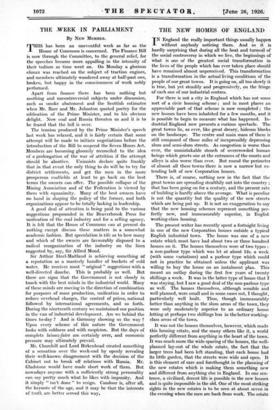T HIS has been an uneventful week as far as the
House of Commons is concerned. The Finance Bill is now through the Committee,' to the general relief, for the speeches became more appalling in the intensity of their tedium as time went on. On Monday a glorious climax was reached on the subject of traction engines, and members ultimately wandered away at half-past one, broken, but happy in the consciousness of work nobly performed. .
Apart from finance there . has been nothing but soothing and uncontroversial subjects under discussion, such as smoke abatement and the Scottish estimates when Mr. Barr and Mr. Johnston quoted poetry for the edification of the Prime Minister, and to his obvious delight. Now coal and Russia threaten us and it is to be feared that the lull is over.
The tension produced by the Prime Minister's speech last week has relaxed, and it is fairly certain that some attempt will be made to initiate negotiations before the introduction of the Bill to suspend the Seven Hours Act. Members are becoming gloomily reconciled to the idea of a prolongation of the war of attrition if the attempt should be abortive. Unionists declare quite frankly that in that event the only thing to do will be to try for district settlements, and get the men in the more prosperous coalfields at least to go back on the best terms the owners can offer. The possible collapse of the Mining Association and of the Federation is viewed by them with equanimity. Many of the best owners have no hand in shaping the policy of the former, and both organizations appear to be totally lacking in leadership.
A good deal of attention is being paid to the various suggestions propounded in the Beaverbrook Press for unification of the coal industry and for a selling agency. It is felt that the House of Commons can at present do nothing except discuss these matters in a somewhat academic fashion. But speculation is rife as to how many and which of the owners are favourably disposed to a radical reorganization of the industry on the lines suggested by, say, Sir Alfred Mond.
Sir Arthur Steel-Maitland is achieving something of a reputation as a masterly handler of buckets of cold water. He receives most " original " suggestions with a well-directed douche. This is probably as well. But there are signs that the Government is not closely in touch with the best minds in the industrial world. Many of these minds are moving in the direction of combination for purposes of mass production, unification in order to reduce overhead charges, the control of prices, national followed by international agreements, and so forth. During the nineteenth century we maintained our position in the van of industrial development. Are we behind the times to-day ? And is Germany showing us the way ? Upon every scheme of this nature the Government looks with coldness and with suspicion. But the days of complete laissez-faire are certainly over, and economic. pressure may ultimately prevail.
Mr. Chuichill and Lord Birkenhead created something of a sensation over the week-end by openly revealing their well-known disagreement with the decision of the Cabinet not to break off relations with Russia. Mr. Gladstone would have made short work of them. But nowadays anyone with a sufficiently strong personality can say pretty much what he likes with impunity. And it simply " isn't done " to resign. Candour is, after all, the keynote of the age, and it may be that the interests of truth are better served this way.










































 Previous page
Previous page